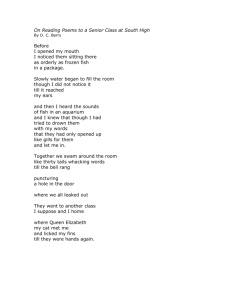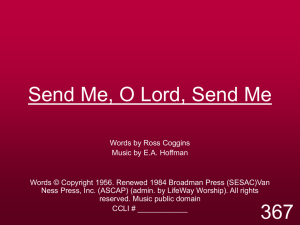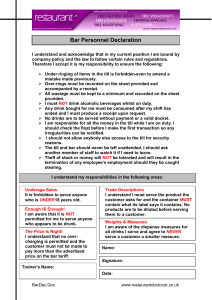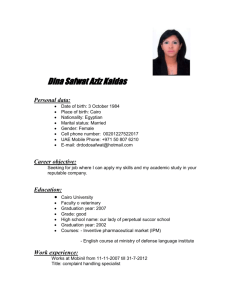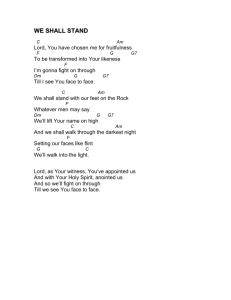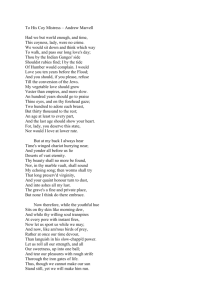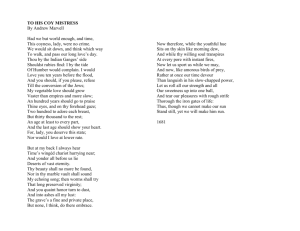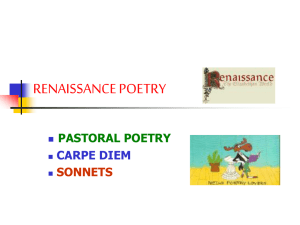File - Mrs. Freeman - Pre
advertisement
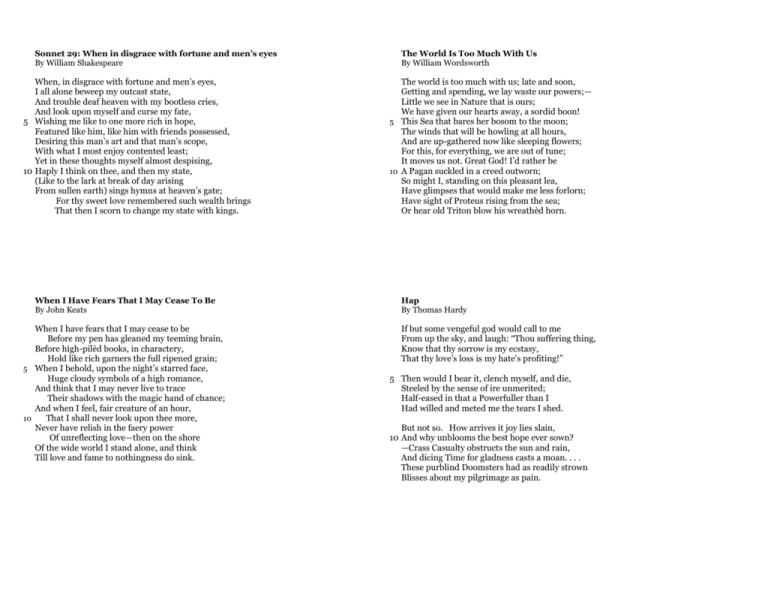
Sonnet 29: When in disgrace with fortune and men’s eyes By William Shakespeare When, in disgrace with fortune and men’s eyes, I all alone beweep my outcast state, And trouble deaf heaven with my bootless cries, And look upon myself and curse my fate, 5 Wishing me like to one more rich in hope, Featured like him, like him with friends possessed, Desiring this man’s art and that man’s scope, With what I most enjoy contented least; Yet in these thoughts myself almost despising, 10 Haply I think on thee, and then my state, (Like to the lark at break of day arising From sullen earth) sings hymns at heaven’s gate; For thy sweet love remembered such wealth brings That then I scorn to change my state with kings. When I Have Fears That I May Cease To Be By John Keats When I have fears that I may cease to be Before my pen has gleaned my teeming brain, Before high-pilèd books, in charactery, Hold like rich garners the full ripened grain; 5 When I behold, upon the night’s starred face, Huge cloudy symbols of a high romance, And think that I may never live to trace Their shadows with the magic hand of chance; And when I feel, fair creature of an hour, 10 That I shall never look upon thee more, Never have relish in the faery power Of unreflecting love—then on the shore Of the wide world I stand alone, and think Till love and fame to nothingness do sink. The World Is Too Much With Us By William Wordsworth The world is too much with us; late and soon, Getting and spending, we lay waste our powers;— Little we see in Nature that is ours; We have given our hearts away, a sordid boon! 5 This Sea that bares her bosom to the moon; The winds that will be howling at all hours, And are up-gathered now like sleeping flowers; For this, for everything, we are out of tune; It moves us not. Great God! I’d rather be 10 A Pagan suckled in a creed outworn; So might I, standing on this pleasant lea, Have glimpses that would make me less forlorn; Have sight of Proteus rising from the sea; Or hear old Triton blow his wreathèd horn. Hap By Thomas Hardy If but some vengeful god would call to me From up the sky, and laugh: “Thou suffering thing, Know that thy sorrow is my ecstasy, That thy love's loss is my hate's profiting!” 5 Then would I bear it, clench myself, and die, Steeled by the sense of ire unmerited; Half-eased in that a Powerfuller than I Had willed and meted me the tears I shed. But not so. How arrives it joy lies slain, 10 And why unblooms the best hope ever sown? —Crass Casualty obstructs the sun and rain, And dicing Time for gladness casts a moan. . . . These purblind Doomsters had as readily strown Blisses about my pilgrimage as pain. Anthem for Doomed Youth By Wilfred Owen What passing-bells for these who die as cattle? — Only the monstrous anger of the guns. Only the stuttering rifles' rapid rattle Can patter out their hasty orisons. 5 No mockeries now for them; no prayers nor bells; Nor any voice of mourning save the choirs,— The shrill, demented choirs of wailing shells; And bugles calling for them from sad shires. 10 What candles may be held to speed them all? Not in the hands of boys, but in their eyes Shall shine the holy glimmers of goodbyes. The pallor of girls' brows shall be their pall; Their flowers the tenderness of patient minds, And each slow dusk a drawing-down of blinds. Carmel Highlands By Janet Loxley Lewis Below the gardens and the darkening pines The living water sinks among the stones, Sinking yet foaming till the snowy tones Merge with the fog drawn landward in dim lines. 5 The cloud dissolves among the flowering vines, And now the definite mountain-side disowns The fluid world, the immeasurable zones. Then white oblivion swallows all designs. But still the rich confusion of the sea, 10 Unceasing voice, sombre and solacing, Rises through veils of silence past the trees; In restless repetition bound, yet free, Wave after wave in deluge fresh releasing An ancient speech, hushed in tremendous ease. England in 1819 By Percy Bysshe Shelley An old, mad, blind, despised, and dying King; Princes, the dregs of their dull race, who flow Through public scorn,—mud from a muddy spring; Rulers who neither see nor feel nor know, 5 But leechlike to their fainting country cling Till they drop, blind in blood, without a blow. A people starved and stabbed in th' untilled field; An army, whom liberticide and prey Makes as a two-edged sword to all who wield; 10 Golden and sanguine laws which tempt and slay; Religion Christless, Godless—a book sealed; A senate, Time’s worst statute, unrepealed— Are graves from which a glorious Phantom may Burst, to illumine our tempestuous day. Fishing By A. E. Stallings The two of them stood in the middle water, The current slipping away, quick and cold, The sun slow at his zenith, sweating gold, Once, in some sullen summer of father and daughter. 5 Maybe he regretted he had brought her— She'd rather have been elsewhere, her look told— Perhaps a year ago, but now too old. Still, she remembered lessons he had taught her: To cast towards shadows, where the sunlight fails 10 And fishes shelter in the undergrowth. And when the unseen strikes, how all else pales Beside the bright-dark struggle, the rainbow wroth, Life and death weighed in the shining scales, The invisible line pulled taut that links them both. Sonnet 55: Not marble nor the gilded monuments By William Shakespeare Not marble nor the gilded monuments Of princes shall outlive this powerful rhyme, But you shall shine more bright in these contents Than unswept stone besmeared with sluttish time. 5 When wasteful war shall statues overturn, And broils root out the work of masonry, Nor Mars his sword nor war’s quick fire shall burn The living record of your memory. ’Gainst death and all-oblivious enmity 10 Shall you pace forth; your praise shall still find room Even in the eyes of all posterity That wear this world out to the ending doom. So, till the Judgement that yourself arise, You live in this, and dwell in lovers’ eyes.
